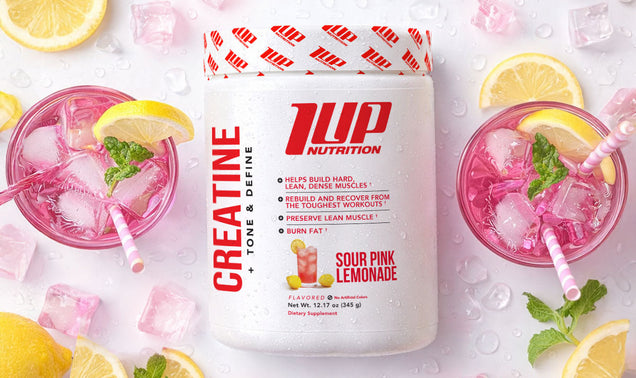Cutting carbs has been a popular trend for several years now, and it’s commonly heralded as the “best” or “easiest” way to lose fat (though that is heavily debatable).
The reality is that you do not need to eliminate carbs to lose weight, get fit, or live a healthy lifestyle.
Carbohydrates (the right kind) can help replenish muscle glycogen, support digestive health, and combat oxidative stress and inflammation.
Now, if you’ve already given up carbohydrates (or seriously reduced the amount that you consume) and are crushing your workouts and getting the results you want, that’s great! Keep doing what works.
If, however, you’re not sure if you should “quit” carbs or not, here are 4 signs you need to add carbs back to your diet.
Your Workouts Are Less Than Stellar
Hard training lies at the very heart of getting results, especially during your transformation challenge.
Carbohydrates can play a pivotal role in your ability to train hard since carbs (glucose) are the body’s preferred source of energy during intense physical activity (such as resistance training).
They not only provide a readily accessible form of energy shortly after eating (as blood sugar) they are also stored in muscle tissue as glycogen — the storage form of glucose the body can utilize when you’re training fasted.
If you find that your workouts are lagging on a low-carb diet, then it may be beneficial to have some fast-digesting carbs before or during your workout.
Tri-Carb is our premier intra workout supplement that supplies three highly effective carbohydrates that supply your muscles with the fuel they need to perform optimally during a workout.
Unlike other carbohydrate supplements, Tri-Carb does not cause GI distress or spike insulin levels, making it the ideal choice for clean, sustained energy before, during, or after training.
One other thing to consider if you’re struggling to give it your all when it’s gym time is a pre workout supplement.
Pre workouts infuse the mind and body with the nutrients they need to boost energy, amplify focus, delay fatigue and get results!
You’re Sore All the Time
Do your workouts leave you in a constant state of wincing or grunting?
If so, you might want to add some carbohydrates back into your diet plan.
As mentioned above, carbohydrates provide the “high-octane fuel” your muscles need to perform intense, explosive activities, like resistance training, HIIT, plyometrics, etc.
They also play a role in the recovery process.
Intense exercise creates microtears in muscle tissue and depletes glycogen, and carbohydrates cause insulin levels to rise, which you want after a workout.
The reason for this is that insulin is a nutrient shuttling hormone, meaning it takes nutrients from the bloodstream and delivers them into muscle tissue where they can help repair and grow lean muscle mass.
Carbohydrates (via insulin) also help stop muscle breakdown, and they replenish energy stores so you can train hard the next day. Plus, the more often you can create overload in your workouts, the faster you can get results!
If you’re looking to optimize post-workout nutrition, aim for a ratio of 2:1 to 4:1 carbohydrates to protein for your post workout meal.
This can be in the form of a whole foods meal (steak and rice) or a protein shake made using a mixture of Tri-Carb and whey protein.
You’re Hungry Immediately After Eating
We’ve all experienced the feeling of being hungry after just eating a meal (we’re looking at you pizza and sushi).
While these foods do contain carbohydrates they are typically pretty low in fiber.
This is important because fiber can play a pivotal role in helping to fill you at mealtime, which means you’re less likely to overeat.
Fiber also supports GI health by providing the microbiome (good bacteria that lives in your gut) with the food it needs to thrive, thereby supporting immune function and total body health.
Current recommendations are for women to consume between 21–25 grams of fiber per day, while men should get 30–38 grams.
You’re Grouchy (and Not Sure Why)
Despite the low-carb rhetoric that carbs aren’t “essential,” a simple fact that can’t be ignored is that our brains require carbs (glucose) to function optimally.
Plus, carbs also help keep us full, and fruits & vegetables are a rich source of polyphenols of polyphenols and antioxidants that support cardiovascular health, muscle recovery, and immune function.
Carbs also make us happy as eating them can trigger the release of certain neuro-chemicals (like dopamine and serotonin) that impact mood and well-being.
If you’re always feeling grumpy or having a difficult time concentrating, it may be time to experiment with adding carbs into your daily diet.
The Best Sources of Carbohydrates
The best sources of carbohydrates are:
- Fruits
- Vegetables (both starch and non-starchy vegetables)
- Whole grains
- Legumes
- Nuts
- Seeds
Fast-digesting carbohydrates can also have a place in the diet, especially if you’re training hard.
Remember that no macronutrient is “bad.”
You can have your “cake” and eat it too. It’s about balance and eating right for your goals.
If you need help building a diet that aligns with your performance and physique goals, then log onto the 1UP Fitness app where we provide customized diet and training information based on your age, gender, and aspirations!






